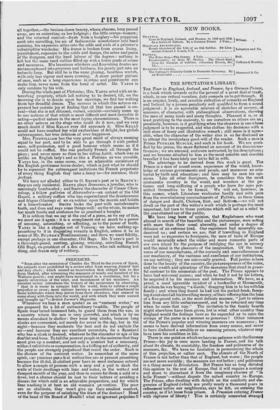PREJUDICES.
"Soon after the accession of Charles the Third to the crown of Spain, his subjects were prohibited by a severe edict from wearing flapped hats and long cloaks ; which caused an insurrection that obliged him to flee from Madrid, after witnessing the massacre of nearly one hundred of his Walloon guards ; and might have terminated in a revolution, but for a speedy revocation of the edict, and banishment of his ministers. An eminent writer introduces the history of the occurrence by observing, that it is easier to conquer half the world, than to subdue a single prejudice or error; most nations having a superstitious attachment to those habitudes which they derive from their ancestors, that seemed to come along with them into the world, and with which they were nursed and brought up.'"—British Farmer's Magazine. Whenever we hear a man quoted as an "eminent writer," we are prepared for a bit of extraordinary twaddle. The people of Spain wear broad- brimmed hats, to guard them from the sun, in a country where the sun is very powerful, and which is by no means abundant in shelter: they wear long cloaks, because long cloaks are convenient, not merely for cover in the day, but in the night—because they moderate the heat and do not exclude the air—and because they are excellent coversluts, for a Spaniard who has a cloak is dressed, whatever be the character or age of his doublet and hose. To tell the poorest people in the universe that they must give up a comfort, and not only a comfort but a necessary, without substitute or compensation, is a trifling act of authority, and the people are strangely prejudiced that resist the order. Such is the dictum of the eminent writer. In somewhat of the same spirit, cur erecious paroehal authorities are at present grumbling because the ill-fed, ill-clothed poor have in most instances refused to allow a couple of persons with a mop and a pail to daub the walls of their dwellings with lime and water, in the wettest and dampest month of the year, and thus to secure for them a cold or a fever, lest a chance should be lost to their betters of avoiding a disease. for which cold is an admirable preparative, and for which lime washing is at best an old woman's preventive. The poor are so obstinate, they won't give up their smallest comfort, even for the purpose of satisfying the fears of the doctors ! Head of the head of the Board of Health! what an ignorant prejudice !!


























 Previous page
Previous page